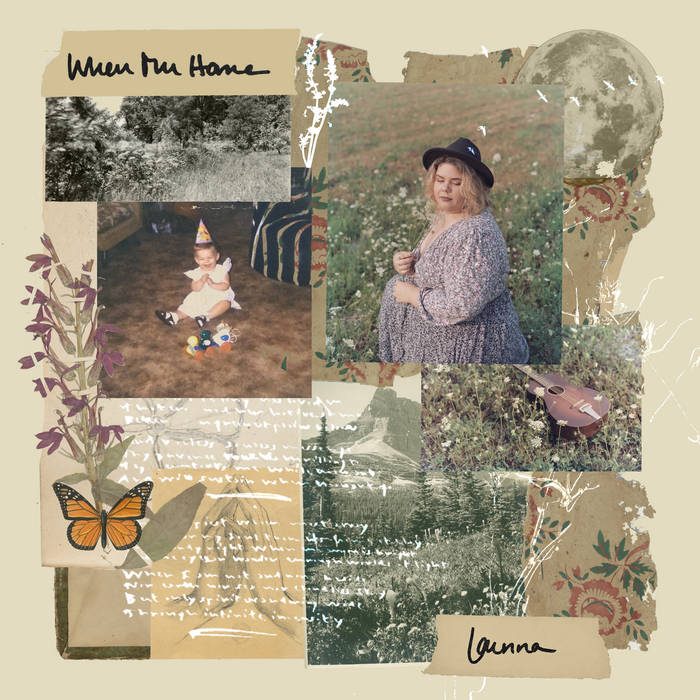|
Lounna is the stage name for folk singer and songwriter Brenna L. Slate, who lives in a small town near Pittsburgh, PA. Self-taught on guitar and banjo, she first appeared on a 2020 home recorded project on Bandcamp titled Sundry Demos. Her debut full-length CD is called When I’m Home, which she calls “a story of a girl going off on her own, realizing she is lost, and then trying to find her way and finding herself. It is a journey of finding home.”
Musically Slate calls this “a modern indie folk album” and marks the first time she has worked with other artists, including Vera Sola (synth strings) and Ol Whitetail (banjo). “I was so used to working alone, (but they) really helped to bring out the best of the songs.” Slate has carried many of these songs for years, and the songs were chosen that worked best together to tell her story. Slate’s inspirations include indie folk bands such as Bear's Den, First Aid Kit, Towr's and Gregory Alan Isakov. However, she feels her sound is more unique: “A bit indie, a bit acoustic and a bit Americana all mixed together.” Recording took place in Slate’s living room using Studio One, which was then mixed and mastered by Rich Mann in HIS living room. The recording quality is good overall, though sometimes boomy and slanted toward the lower end of the EQ scale. “Pennies in the Fountain” establishes the Lounna sound with Slate playing what sounds like a nylon string acoustic guitar (with that nice low-end sound) which is then embellished with her own vocals and filled out with faux strings and simple beats. Slate has a lovely, strong singing voice that easily lends itself to doubling and harmonies. A certain “Ol Whitetail” plays banjo, as he does on several other tracks. Thematically this feels like a sad song about trying to love someone who can’t be tied down to a person or place. “Monarch to Mexico” is a more upbeat, folky track with the same instrumentation as before, though this one feels a bit more roomy and live-sounding. I love the lyrical device of comparing a bittersweet relationship with the migration of Monarch butterflies to Mexico. “Lavender Wine” is the first track where Slate records all instruments including banjo, which she plays in a remarkably similar style to her collaborator Ol Whitetail. Here’s another song about love where this time the narrator yearns for a return of her partner, and Slate takes the opportunity to perform some amazing falsetto vocals with fewer overdubs, mostly standing on her own. The synth backings are creative and exciting as the song gains energy and momentum. Of the first three tracks this is my clear favorite. “Valley (Of the Moon)” returns Whitetail to banjo duties and introduces Vera Sola on synth strings. The first time I heard this album through I was aware that some songs had guests and some were Slate solo, but I was amazed (then and now) how consistent the arrangements feel. This track features a slow, steady beat with perhaps more toms than before. Slate’s chorus vocals are carefully overdubbed and carry a lot of power and pain. The next two tracks are Slate solo performances. “Mississippi” feels a bit more traditionally folky, perhaps just for the use of “Mississippi” as an avatar for homesteading while awaiting someone’s return. There’s even a hint of Irish traditional in the background synth strings. “Fields of Thistle” is a shorter track that uses a similar lyrical device, substituting thistle fields (sounds scratchy!) for the Mississippi River. Musically it’s built on a simple repeating pattern that acts as a refreshing “palette cleanser.” “Cliffside Dreaming” brings back string arranger Vera Sola, who provides otherworldly cello samples that seem to be pitched somewhere below sea level. Having said this, I’ve just noticed that the lyrics do conjure visions of cliff ??sides, stormy oceans and trees rooted to the edge of mountains, so the music certainly reinforces those themes. “From the Cradle to the Grave” was an interesting title for Slate to pick, as there are at least two other songs by that name: one by speed metal band Havok, but more pertinently by folk guitarist Leo Kottke. I was a little sad that this was not a cover of the Kottke tune, but like that song, this one is a cautionary tale about fully embracing life as it is lived, and not just “surviving.” The imagery Slate uses (silver dollars on the beach, a train trip, grass and flowers) has the feel of actual events from the narrator’s life. The music is nice though this track doesn’t rhythmically cohere quite as much as the others. “Sycamore” ends the album with a full solo performance by Slate, and it very literally completes the album’s theme of “the journey of finding home.” It’s simple and very folky, with especially sweet, restrained vocal harmonies and a beautiful string arrangement. This is an amazing collection of tunes by an artist who’s been gestating for a long time, finding herself artistically at last. It’s a joyous expression of self-discovery that becomes a gift to her listeners, the numbers of which I’m sure will grow with this assured debut album.
0 Comments
Your comment will be posted after it is approved.
Leave a Reply. |
Critique/insightWe are dedicated to informing the public about the different types of independent music that is available for your listening pleasure as well as giving the artist a professional critique from a seasoned music geek. We critique a wide variety of niche genres like experimental, IDM, electronic, ambient, shoegaze and much more.
Are you one of our faithful visitors who enjoys our website? Like us on Facebook
Archives
July 2024
|

